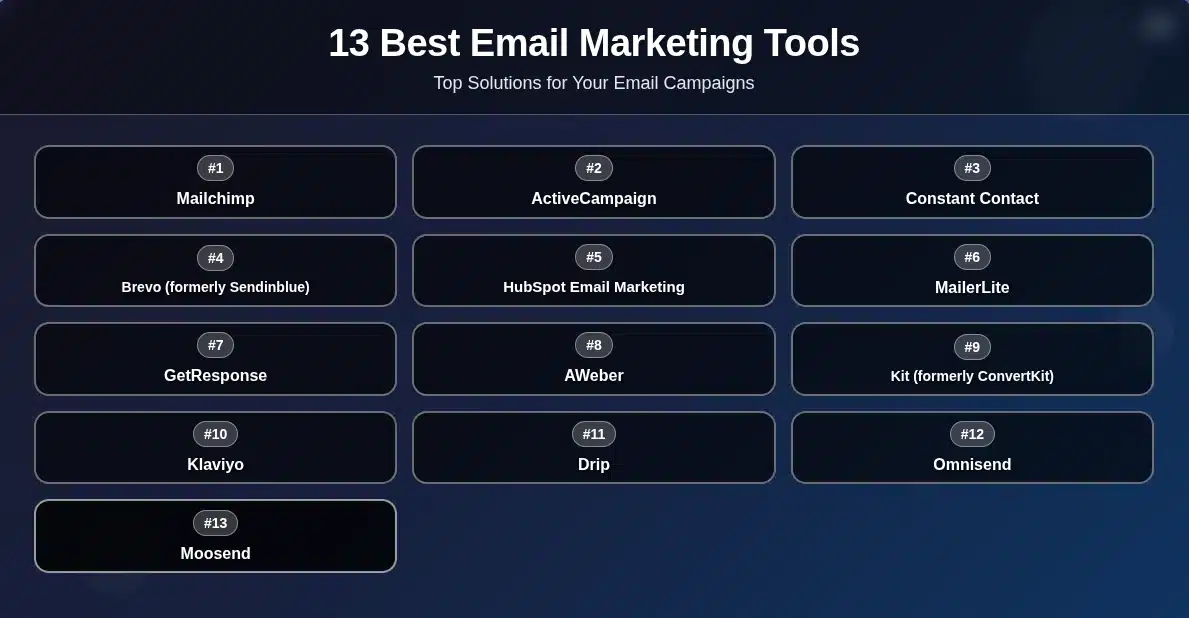You need effective tools to manage campaigns, automate tasks, and track performance. Each tool offers unique features like drag-and-drop editors, automation, and analytics. Some focus on small businesses, while others cater to e-commerce or content creators. Consider your business size, budget, and specific needs when choosing.
Learn to generate high-quality leads with proven digital marketing strategies. This lead generation course teaches mastering lead generation and conversion using content marketing, email marketing and affiliate programs.
Top 13 Email Marketing Tools
Below is a detailed look at the top 13 email marketing tools, including their features, benefits, pricing, and limitations.
1. Mailchimp
Mailchimp is one of the most popular email marketing platforms. Many small businesses use it for its simplicity and free plan.
- What it does: You get a drag-and-drop email builder to create professional emails quickly. It offers basic automation like welcome emails and audience segmentation. You can build landing pages and forms. It includes reporting and analytics.
- Why it’s great: The free plan supports up to 500 contacts, ideal for beginners. The interface is user-friendly. You get strong analytics to track performance.
- Free Plan: Up to 500 contacts and 1,000 email sends per month. Includes basic campaigns, forms, and limited reporting. Email support for the first 30 days.
- Paid Plans (for 500 contacts):
- Essentials: $13-$15/month. Includes 5,000 email sends, A/B testing, and 24/7 support.
- Standard: $20-$23/month. Adds advanced automation, custom templates, and enhanced reporting. Offers 12x contact count in sends.
- Premium: $350+/month (for 10,000 contacts). Offers unlimited contacts, priority support, and advanced segmentation. Provides 15x contact count in sends.
- Key Limits: Free plan limits contacts, sends, and automation. Paid plans scale with contact count.
2. ActiveCampaign
ActiveCampaign is ideal for businesses wanting advanced automation and CRM integration.
- What it does: Combines email marketing with CRM and sales automation. You create complex workflows based on user behavior. It offers advanced segmentation, lead scoring, SMS, and site messaging.
- Why it’s great: Top-notch automation for personalized customer journeys. It helps manage leads and boost conversions.
- Free Plan: None.
- Free Trial: 14-day trial for all paid plans.
- Paid Plans (for 1,000 contacts):
- Starter: $15/month. Includes email marketing, simple automation, and web forms. Sends 10-12x contact count.
- Plus: $49/month. Adds CRM, landing pages, and SMS. Up to 3 users.
- Pro: $79/month. Includes predictive sending and custom reporting.
- Enterprise: Custom pricing. Offers advanced security and unlimited users.
- Key Limits: No free plan. Pricing scales with contacts. Email send caps apply.
3. Constant Contact
Constant Contact is a solid choice for small businesses and non-profits due to its ease of use.
- What it does: Offers a simple drag-and-drop editor and many templates. You can manage contacts and track campaigns. It includes social media and event management tools.
- Why it’s great: Easy to learn. Quick campaign setup. Good customer support and a mobile app.
- Free Plan: None.
- Free Trial: 60-day trial with up to 100 emails and unlimited contacts.
- Paid Plans (for 500 contacts):
- Lite: $12/month. Basic features and templates. Sends 10x contact tier.
- Standard: $35/month. Adds automation and A/B testing. Sends 12x contact tier.
- Premium: $80/month. Offers dynamic content and more storage. Sends 24x contact tier.
- Key Limits: No free plan. Email sends are tied to contact tier.
4. Brevo (formerly Sendinblue)
Brevo is an all-in-one platform combining email, SMS, chat, and CRM.
- What it does: Provides a drag-and-drop email builder, personalization, and automation. Offers transactional emails and audience segmentation.
- Why it’s great: Versatile for businesses needing multiple channels. Competitive free plan and scalable pricing.
- Free Plan: 300 emails per day. Includes campaigns, templates, and SMS marketing.
- Paid Plans:
- Starter: $9/month. Removes daily limit, up to 5,000 emails/month.
- Business: $19/month. Adds automation and multi-user access.
- Enterprise: Custom pricing. Offers unlimited contacts and priority support.
- Key Limits: Free plan has a daily send limit. Paid plans scale by email volume.
5. HubSpot Email Marketing
HubSpot integrates email marketing with its comprehensive CRM platform.
- What it does: Create professional emails with a drag-and-drop editor. Integrates with HubSpot CRM for personalization. Includes A/B testing and analytics.
- Why it’s great: Perfect for HubSpot CRM users. Offers unified marketing and advanced personalization.
- Free Plan: Up to 2,000 emails per month with basic personalization and CRM integration.
- Paid Plans (for 1,000 marketing contacts):
- Starter: $20/month (billed annually). Sends 5x contact tier.
- Professional: $890/month. Sends 10x contact tier. Adds automation and social media tools.
- Enterprise: $3,600/month. Sends 20x contact tier. Advanced features.
- Key Limits: Free plan limits sends and features. Paid plans are pricey and scale with contacts.
6. MailerLite
MailerLite is simple and affordable, great for small businesses and creatives.
- What it does: Offers a clean drag-and-drop editor, automation, landing pages, and pop-ups. You can sell digital products.
- Why it’s great: User-friendly and budget-friendly. Good deliverability and support. Generous free plan.
- Free Plan: 1,000 subscribers, 12,000 emails/month. Includes automation and landing pages.
- Paid Plans (for 1,000 subscribers):
- Growing Business: $10/month. Unlimited emails and website builder.
- Advanced: $20/month. Adds Facebook audiences and multiple triggers.
- Enterprise: Custom pricing for large lists.
- Key Limits: Free plan caps subscribers. Paid plans scale with subscribers.
7. GetResponse
GetResponse offers a wide range of tools, including webinars and website building.
- What it does: Includes email marketing, automation, landing pages, and webinars. Offers AI email generation and detailed customer journeys.
- Why it’s great: All-in-one solution. Strong automation and webinar hosting.
- Free Plan: 500 contacts, 2,500 emails/month. Includes website builder and landing page.
- Paid Plans (for 1,000 contacts):
- Email Marketing: $19/month. Unlimited emails and basic automation.
- Marketing Automation: $59/month. Adds webinars and behavioral segmentation.
- Ecommerce Marketing: $119/month. Includes e-commerce features.
- Key Limits: Free plan limits contacts and premium features. Paid plans scale with subscribers.
8. AWeber
AWeber is a reliable, user-friendly platform with a long history.
- What it does: Offers a drag-and-drop builder, templates, and automation. Provides strong list management and segmentation.
- Why it’s great: High deliverability. Automates based on subscriber actions. Integrates with many tools.
- Free Plan: 500 subscribers, 3,000 emails/month. Includes design tools and automation.
- Paid Plans (for 500 subscribers):
- Lite: $15/month. Sends 10x subscriber count.
- Plus: $30/month. Sends 12x subscriber count. Full features.
- Unlimited: $899/month. Unlimited subscribers, 15x sends.
- Key Limits: Free plan limits subscribers and sends. Paid plans scale with subscribers.
9. Kit (formerly ConvertKit)
Kit is designed for content creators like bloggers and course creators.
- What it does: Focuses on segmentation and automation. Offers landing pages, forms, and digital product delivery.
- Why it’s great: Built for creators. Easy to manage products and segment audiences. Free plan for small lists.
- Free Plan: 1,000 subscribers. Includes broadcasts, forms, and segmentation.
- Paid Plans (for 1,000 subscribers):
- Creator: $25/month. Adds automation and integrations.
- Creator Pro: $50/month. Includes advanced reporting and subscriber scoring.
- Key Limits: Free plan lacks advanced automation. Paid plans scale with subscribers.
10. Klaviyo
Klaviyo is tailored for e-commerce with email and SMS automation.
- What it does: Sends personalized emails and SMS. Offers abandoned cart flows, win-back campaigns, and product recommendations. Integrates with e-commerce platforms.
- Why it’s great: Powerful e-commerce automation. Segments based on purchase history. Drives sales.
- Free Plan: 250 active profiles, 500 emails/month. Includes 150 SMS credits.
- Paid Plans (for 251-500 active profiles):
- Email Plan: $20/month. 5,000 emails, 150 SMS credits.
- Email + SMS Plan: $35/month. 1,250 SMS credits and push notifications.
- Key Limits: Pricing based on active profiles. Plans auto-adjust with profile count.
11. Drip
Drip is an e-commerce-focused automation platform.
- What it does: Creates personalized experiences with a visual workflow builder. Offers lead scoring and SMS. Tracks conversions effectively.
- Why it’s great: Strong e-commerce integrations. Targeted emails and automation for online stores.
- Free Plan: None.
- Free Trial: 14-day trial.
- Paid Plans: Starts at $39/month for 1-5,000 subscribers. Unlimited emails.
- Key Limits: No free plan. Pricing scales with active subscribers and auto-upgrades.
12. Omnisend
Omnisend is a multichannel platform for e-commerce businesses.
- What it does: Offers email templates, automation, and segmentation. Combines email, SMS, and web push notifications. Includes abandoned cart recovery.
- Why it’s great: Reaches customers through multiple channels. Tailored e-commerce automation.
- Free Plan: 500 emails, 60 SMS/month. Includes basic automation.
- Paid Plans (for 500 contacts):
- Standard: $16/month. 6,000 emails, automation, and SMS.
- Pro: $59/month. Unlimited emails and more SMS credits.
- Key Limits: Free plan limits emails and SMS. Paid plans scale with contacts.
13. Moosend
Moosend is an affordable platform with advanced features.
- What it does: Offers a drag-and-drop editor, automation, and landing pages. Includes A/B testing and analytics.
- Why it’s great: Competitive pricing. Good automation options. Great value for businesses.
- Free Plan: 1,000 subscribers, unlimited emails. Includes editor and forms.
- Paid Plans (for 1,000 subscribers):
- Pro: $9/month. Adds landing pages and transactional emails.
- Enterprise: Custom pricing. Includes dedicated IP and account manager.
- Key Limits: Free plan limits advanced features. Paid plans scale with subscribers.
Join our digital marketing course to master content marketing, paid ads, social media, and analytics. Also, learn how to use cutting-edge tools to boost your online presence and drive engagement.
Recommended Tools by Use Case
To help you choose, here are recommendations based on common scenarios. Consider your business type, budget, and goals.
1. For Small Businesses or Beginners
If you’re starting out, have a small list (under 1,000 contacts), and want a free or low-cost tool with an easy interface, consider these:
Mailchimp
- Why: Free plan for up to 500 contacts and 1,000 emails/month. User-friendly drag-and-drop editor. Great for basic campaigns and analytics.
- Best for: Small businesses or startups testing email marketing.
- Cost: Free plan; paid plans start at $13/month for 500 contacts.
MailerLite
- Why: Free plan for 1,000 subscribers and 12,000 emails/month. Simple editor and automation. Affordable paid plans.
- Best for: Freelancers, bloggers, or small teams needing simplicity.
- Cost: Free plan; paid plans start at $10/month for 1,000 subscribers.
Moosend
- Why: Free plan for 1,000 subscribers with unlimited emails. Easy to use and cost-effective for growing lists.
- Best for: Budget-conscious businesses wanting basic automation.
- Cost: Free plan; paid plans start at $9/month for 1,000 subscribers.
2. For E-commerce Businesses
If you run an online store and need tools for abandoned cart emails, product recommendations, or integrations with platforms like Shopify, consider these:
Klaviyo
- Why: Built for e-commerce with deep integrations. Automates abandoned cart flows and segments based on purchase history. Free plan for small lists.
- Best for: Online retailers wanting to drive sales through email and SMS.
- Cost: Free for 250 active profiles; paid plans start at $20/month for 500 profiles.
Omnisend
- Why: Combines email, SMS, and push notifications. Offers e-commerce-specific automation like cart recovery. Free plan for small campaigns.
- Best for: E-commerce businesses needing multichannel marketing.
- Cost: Free for 500 emails/month; paid plans start at $16/month for 500 contacts.
Drip
- Why: E-commerce-focused with visual workflows and personalization. Strong for targeting based on customer behavior.
- Best for: Growing online stores needing advanced automation.
- Cost: 14-day free trial; paid plans start at $39/month for 1-5,000 subscribers.
3. For Content Creators
If you’re a blogger, YouTuber, or course creator focused on building an audience and selling digital products, consider:
ConvertKit
- Why: Designed for creators with easy segmentation and digital product delivery. Free plan for up to 1,000 subscribers.
- Best for: Content creators managing multiple products or audiences.
- Cost: Free for 1,000 subscribers; paid plans start at $25/month for 1,000 subscribers.
MailerLite
- Why: Simple and affordable with landing pages and pop-ups for growing lists. Supports digital product sales.
- Best for: Creators needing a budget-friendly tool.
- Cost: Free for 1,000 subscribers; paid plans start at $10/month.
4. For Advanced Automation Needs
If you want complex workflows, CRM integration, or behavioral automation, consider:
ActiveCampaign
- Why: Powerful automation and CRM features. Creates personalized customer journeys with lead scoring and SMS.
- Best for: Businesses needing advanced marketing and sales automation.
- Cost: 14-day free trial; paid plans start at $15/month for 1,000 contacts.
HubSpot Email Marketing
- Why: Seamless CRM integration for personalization. Great for businesses already using HubSpot’s ecosystem.
- Best for: Companies with a larger budget wanting a unified platform.
- Cost: Free for 2,000 emails/month; paid plans start at $20/month for 1,000 contacts.
GetResponse
- Why: Offers automation, webinars, and AI email generation. Good for detailed customer journeys.
- Best for: Businesses combining email with webinars or e-commerce.
- Cost: Free for 500 contacts; paid plans start at $19/month for 1,000 contacts.
5. For Non-Profits or Simple Campaigns
If you’re a non-profit or need a straightforward tool for newsletters and events, consider:
Constant Contact
- Why: Easy to learn with templates and event management tools. Strong support and a long free trial.
- Best for: Non-profits or small businesses needing simple campaigns.
- Cost: 60-day free trial; paid plans start at $12/month for 500 contacts.
Brevo
- Why: Free plan with 300 emails/day. Combines email, SMS, and CRM for versatile campaigns.
- Best for: Organizations wanting multiple channels on a budget.
- Cost: Free for 300 emails/day; paid plans start at $9/month.
6. For Reliable, All-Purpose Tools
If you want a dependable tool with a balance of features and deliverability, consider:
AWeber
- Why: Reliable with high deliverability. Offers automation and a large template library. Free plan for small lists.
- Best for: Businesses wanting a trusted, easy-to-use platform.
- Cost: Free for 500 subscribers; paid plans start at $15/month for 500 subscribers.
How to Narrow Down Your Choice
- Step 1: Define your goals (e.g., grow your list, automate sales, or send newsletters).
- Step 2: Set a budget. Free plans like Mailchimp, MailerLite, or ConvertKit are great for testing.
- Step 3: Check integrations. Ensure the tool works with your website, CRM, or e-commerce platform.
- Step 4: Test free plans or trials. Most tools offer free tiers or trials to explore features.
- Step 5: Review limits. Check contact or email send caps to avoid surprises as you grow.




